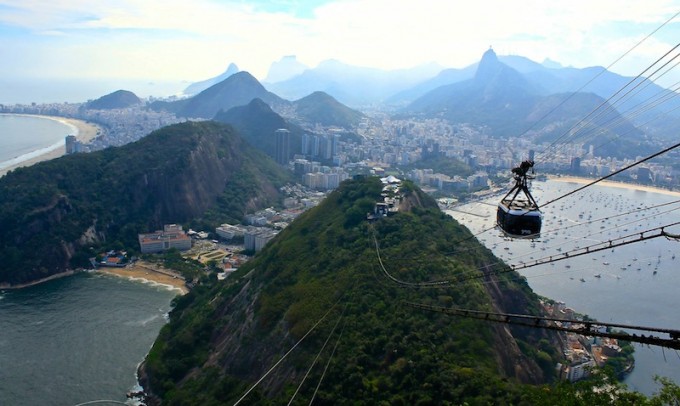
Summer 2015
If you’ve ever looked down at Rio De Janeiro from halfway up the Corcovado mountain, what do you think and feel? Staring down at pollution haze, traffic jams, the toxic coast, knowing you’d better not hang around past sundown, you may despair at what humanity has done to the planet…. the world’s most beautiful urban setting baking in concrete as if overwhelmed by alien termites. And yet on some hot summer evening, the city lights starting to flicker, samba music wafting up the jungle slopes…. you may feel pretty good about the human race after all.
Filming in Rio, over decades now, I’ve felt both ways.
What’s the truth? Have we made the planet a better or worse place to live? I don’t know, but I’d like to, and that’s why I made Anthropocene.
I fell in love with the word Anthropocene in 2008. It sounded like the title of a novel by JG Ballard or William Gibson. The paper which crystallized the idea – The Anthropocene: Are Humans Now Overwhelming the Great Forces of Nature? by Will Steffen, Paul J. Crutzen and John R. McNeill – had been published a year earlier.
It’s a short and remarkable paper which summarizes the case that we’re living in a man-made geological epoch – and also tells its story. And it did read almost like Science Fiction. So what, I wondered, if you filmed it like one? What would you make of it? Would it make you laugh or cry? Would it be a tragedy, a comedy, or something more surreal? Would it finally convince you the view from Corcovado is a dystopian vision? Or a heart-warming one?
I met up with Working Party chair Professor Jan Zalasiewicz in London and asked if his colleagues would co-operate in making a documentary about the Anthropocene. We wouldn’t try and call the shots – geologically the term is still moot and the subject of vigorous academic debate – but tell the story of the human impact on the planet. And discuss its meaning through the voices of the people helping make the, literally, epochal decision.
We kept to the Working Party because we wanted to tell a story – we didn’t want to construct an essay. We reckoned that once we left this magic circle, we could interview anyone, and the film would become about us, entirely shaped by our selection of the cast. We included just one outside observer, Dr Monica Berger, whose views lifted the story in an original and compelling way.
Our team doesn’t lack environmental credentials… as a BBC TV correspondent I reported some of the first TV documentaries about global warming, and presented BBC radio’s first environmental magazine; producer Jenny Richards was responsible for many ‘green’ films as Deputy Director of TVE (Television for the Environment) and Sotira Kyriacou edited many of them. But this time we didn’t want to make a filmed essay, or investigative report – or green polemic.
Instead we reckoned our Working Party members – the narrators in a film without commentary – would have a spectrum of views: from Andy Revkin’s weariness with pessimism to Eric Odada’s fears of extinction, from Jan Zalasiewicz’s millennial view to Davor Vidas’s jurisprudential perspective.
We haven’t had any outside funding for the film. We began simply by volunteering film-maker Alex Gabbay to help us film Working Party members we could reach in the UK. Over the years – when not working on feature films like Ill Manors – Sotira helped stitch our interviews together as we travelled to Zurich, Oslo and the Rift Valley to complete our cast list. We had to abandon grandiose visions of reconstructing prehistory with Computer Generated Imagery.
We started adding largely Public Domain archive – and some of our own images – but the film didn’t look right until we realized what a difference the breath and beauty of the photo library run by Panos Pictures – of whose parent non-profit Jenny used to be a trustee – could make to our film.
I’ve no idea whether we’re living in a new geological epoch. I’m a journalist and film-maker. That’s a decision for the International Stratigraphy Commission’s Working Party to recommend, maybe later in 2016. It’s not yet a done deal.
What interested me was finding an answer to the Corcovado Dilemma.
Meantime as Monica Berger says, our Anthropocene story represents a common human narrative. I’d add a secular narrative And, in an often fundamentalist age, that may not be without its advantages.
Reaction has ranged from “I feel like I’m Civilization having a near-death experience” to “the film reset my world view,” and “I feel genuinely disturbed.”
Now we want to try and bring the film to a screen near you.